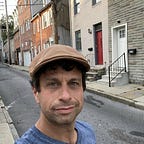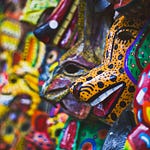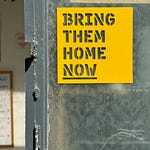Today is Yitzhak Rabin’s 30th yahrzeit. This past Shabbat, I played a song I wrote 29 years ago after the first year anniversary. Below is the text, including my introductory remarks, song lyrics, and a brief coda.
Prelude:
This coming Tuesday is the 30th Anniversary of Yitzhak Rabin’s assassination. Monday is his yahrzeit. It’s hard to believe it’s been three decades. It’s even harder to wrap my head around how much has changed – and how much has stayed the same since then. Rabin was killed on November 4, 1995, by a Jewish extremist who wished to upend the Oslo Peace Process. It came on the heels of several Hamas run terrorist attacks. In summer of ‘96, I arrived in Israel for Ulpan and a year of study at Hebrew University on Mt. Scopus. On kibbutz in the Galil, I met Janis Coulter, also a student, who would be murdered years later by Hamas at Hebrew U during the 2nd Intifada, in a cafeteria we once frequented. In November of ‘96, though, Janis and I joined several friends and traveled to Tel Aviv for a peace rally and memorial marking one year since Rabin’s assassination.
In the months that followed, I found myself processing a cascade of feelings and experiences during a dizzying time. On one hand, I was having an amazing year, making friends, learning and exploring my Judaism in Yerushalayim, traveling around the country at a time when peace still seemed possible. I had an internship at the WF Albright Institute in East Jerusalem. I would walk down from Har Hatzofim, stop at my favorite Palestinian falafel stand, spend a few hours labeling pottery sherds and then enter the Old City through the Damascus Gate, occasionally stopping to get a treat at the Arab suk.
On the other hand, Netanyahu had just been elected Prime Minister for the first time. He and Arafat both would prove disinterested in making real concessions or pursuing lasting solutions. Months after Rabin’s murder, just after Ramadan, and a few months before I arrived to Israel, Hamas has done its own very substantial damage to the peace process when it planned and executed four terrorist attacks in nine days, killing 61 and injuring over 200. The last of these took place at Dizengoff Center, in the heart of Tel Aviv, on Purim, as children milled about in their costumes. The bomb, laced with nails and screws, wounded 130 Israelis and killed one soldier and twelve civilians, including five who were thirteen years old or younger.
In early ’97, still living on Mt. Scopus, I wrote a song called “Jerusalem 5756,” reflecting on the year including and following Rabin’s assassination, the year that concluded with my Rosh Hashanah on kibbutz. I’d like to play it for you today. The song is a chronicle of a young man’s heartbreak and confusion, trying to discern my own place among the Jewish people, confronting the ferocity of anti-Jewish hatred, yearning for peace. The tune concludes with the narrator, present at once in the newly renamed Rabin Square and also on Mount Herzl where the slain leader is buried, reflecting on Rabin’s final moments, chuckling at his awkward smile and his tone-deaf singing of “Shir L’Shalom,” wondering what would become of this country with which I had fallen deeply in love. Here’s my love song, my tribute, to an embattled ancient city and a resilient ancient people. This is “Jerusalem 5756.”
The sun was going down as we drove into town on the bus coming from Tel Aviv. As we rounded the turn I could feel my heart yearn for the city I’d so longed to see. But my eyes found instead the roadblock ahead, and a soldier stepped out of the booth. And we all heard him say, “there were more killed today,” as he cautiously waved us on through.
At the close of the day I found my way to the heart of the city of gold. Then at last the sun fell, and the siren, it welcomed the bride to her city of old. And as the men gathered round I drank in the sound of their prayers rising up from the wall. But when they turned around I just stared at the ground like a child lost in the dark.
And I feel so helpless again as I wander at night through the streets. And I cry for Jerusalem for the 3,000 years she has seen.
When the month reached its end I cried again as my vision had vanished in flames. From their prayer they had turned to an anger that burned and a vengeance which could not be tamed. Four times the Earth trembled in fear and in hell as countless were lost without need. And I closed my eyes tried to block out the cries of the children who’d died in the streets.
And I feel so helpless again as I wander at night through the streets. Tell me why my Jerusalem do you suffer for all that you’ve seen?
Remembering one year ago when the candles burned slowly to rhythms and visions of peace. Then he sang the last song as the cheers lingered on and we laughed at the smile on his face. But when he left our sight, three shots in the night. And “why” was all we could say. And I looked around, took a stone from the ground, and I placed it on top of his grave.
And I feel so helpless again as I wander at night through the streets. And I cry for Jerusalem for her struggle at last to be free. Yes, I feel so helpless and then in the night I cry out from the streets. Still you try my... Will it end? Oh... Close your eyes my Jerusalem. Close your eyes for perhaps in the dark, we can dream.
©1997 by Daniel Burg
Postlude:
“Amar Rabbi Yochanan, Rabbi Yochanan said: In your eyes there is a white part, through which you are not able to see, and a dark part in the middle of the eye, by means of which one does see. In other words, one can [only] see out of the dark part of the eye….” 29 years ago, I prayed for dreams of a better tomorrow to emerge from the darkness. We dream with our eyes closed, but we see, through darkness, with our eyes wide open. This week, on this 30th yahrzeit, we remember a man, battle scarred, who dared to dream, whose very life was bound up in service of Medinat Yisrael, who knew well the darkness of war, who died skeptical, clear-eyed yet hopeful, al kiddush Hashem, a grudging martyr, for an unlikely peace. Yehi zichro baruch, may his memory be for a blessing. And may his hope against hope ultimately prove not to have been in vain” (Midrash Tanchuma Tetzaveh 6).










